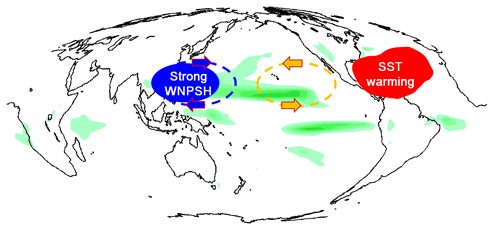The Tropical Atlantic SST Affects the Western North Pacific Subtropical High
Date:2015-10-28
The western North Pacific subtropical High (WNPSH) is crucial to the East Asian summer climate through providing water vapor to the rain belt. The WNPSH is mainly controlled by the tropical SST and the impacts of tropical Pacific El Ni?o and Indian Ocean on the WNPSH have been widely studied. However, less attention has been paid on the tropical Atlantic Ocean. Moreover, the tropical Atlantic Ocean is warming during recent decades but its climate effect on the East Asia remains unclear.
CHEN Wei and LU Riyu from the Institute of Atmospheric Physics (IAP/CAS) and their collaborators form Korea and UK suggested a significant impact of tropical Atlantic SST on the WNPSH. “And we also found the tropical Atlantic SST is the most important factor to the WNPSH, besides the El Ni?o signal,” said Dr. CHEN, “A warming in the tropical Atlantic Ocean results in an enhanced WNPSH.”

Schematic diagram of the physical process for the impact of Atlantic SST on the WNPSH (Chen et al., 2015)
The major physical process proposed is that the tropical Atlantic warming induces a pair of cyclonic circulation anomalies over the eastern Pacific and negative precipitation anomalies over the eastern to central tropical Pacific, which in turn lead to an anticyclonic circulation anomaly over the western to central North Pacific.
The results suggested a robust impact of tropical Atlantic SST on the WNPSH and proposed that the effect of the SST in the tropical Atlantic Ocean may be increasingly critical for understanding and projecting East Asia and western North Pacific monsoon variability, based on the recent and projected warming in the Atlantic.
The paper has been published on Climate Dynamics recently.
Chen, W., J.-Y. Lee, R. Lu, B. Dong and K.-J. Ha, 2015: Intensified impact of tropical Atlantic SST on the western North Pacific summer climate under a weakened Atlantic thermohaline circulation. Climate Dyn., 45(7), 2033-2046, doi:10.1007/s00382-014-2454-4.
